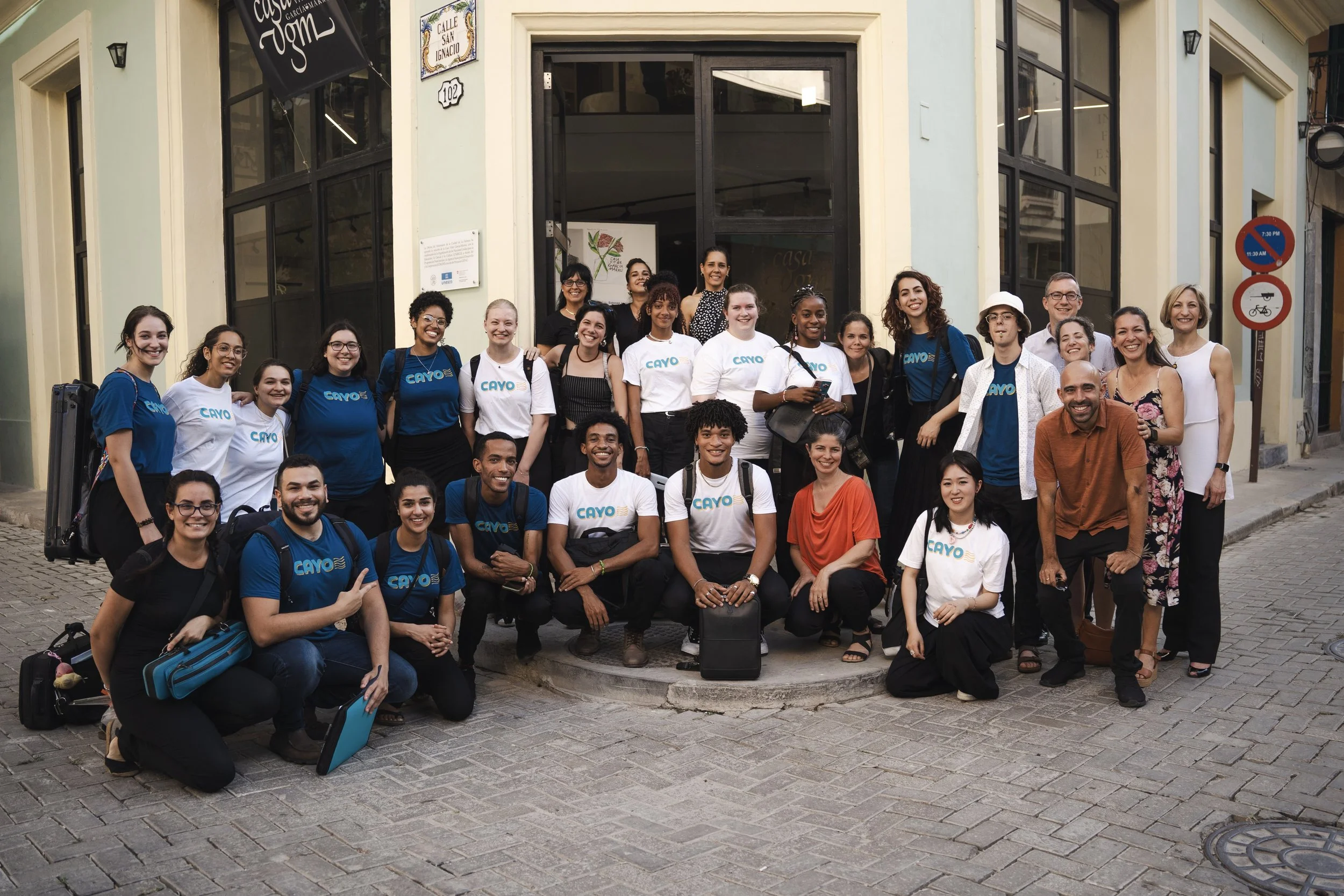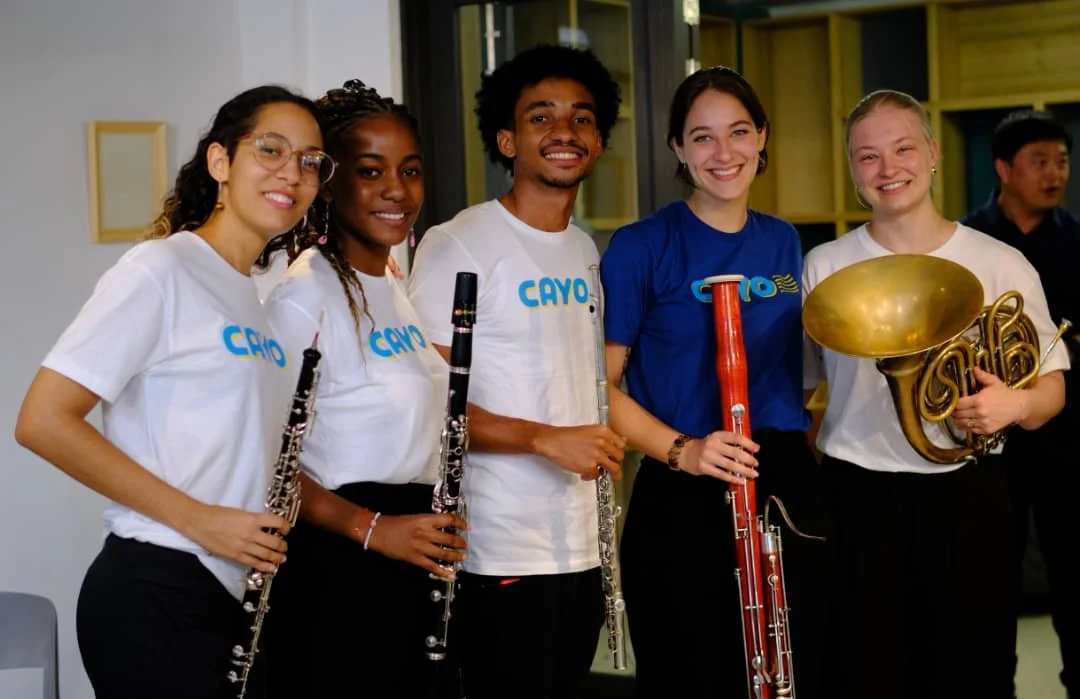
Welcome
Woodwind Week
May 19-24, 2025
-
Miami connections:
May 19: MIA-HAV AA 837 12:25-1:50 pm
May 24: HAV-MIA AA 253 3:55-5:00 pm
Houston connections:
May 19: IAH-HAV UA 1506 12:01-3:30 PM
May 24: HAV-IAH UA 1507 4:35-5:56 PM
BAGGAGE INFO according to AA:
Each passenger traveling to Cuba may only check up to 2 bags* with a maximum weight of 70 lbs / 32 kgs per bag, plus 1 carry-on bag and 1 personal item.
Your first checked bag is free; your second is $150.
BAGGAGE INFO according to UA:
First checked bag: $40
Prepaid: $35
Second checked bag: $100
50lbs (23kgs) limit
-
Casa Verde
Calle 9 #403 entre F y G, Vedado,
Casa 1920
Calle Calzada Nº 407, Bajos, e/ F y G
-
There is a lack of basic products that we consider “essential” in stores in Cuba. Here are some other items to remember when packing. Do NOT assume you will be able to get what you forget in a store in Cuba. Your casa will have sheets, blankets, and towels as you would expect in a hotel.
Be prepared for high 80’s during the day and 70s in the evening. In general, clothing should be on the informal side. Schools are not air-conditioned and it will be very hot and humid. Your bedrooms and all restaurants will have AC. Consider bringing a small USB-powered fan.
● Sunscreen/sunglasses/sun hat
● Black bottom/CAYO top for performance (will be handed out in Havana)
● Umbrella/rain jacket
● Contacts/solution/glasses if needed
● Labeled prescription medication, epi-pens, and over-the-counter meds (extra in case of travel delays)
● Mosquito repellent
● Water filtration bottle like this
● Traveler’s prescriptions in case of stomach bugs
● Anti-itch medication and Benadryl
● Plastic baggies for storing things throughout the day (snacks, etc)
● Kleenex hand packs/portable toilet paper/roll of toilet paper
● Hand sanitizer
● Chargers and batteries including a portable charger in case of power outages
● Bathing suits
● Feminine hygiene products
● Protein snacks, almonds, bars, etc.
● Rechargeable fan (optional, usually not needed in winter)
● Pepto-bismol, chewable, taken with 2-3 meals a day to prevent digestive issues while traveling
-
-
RECOMMENDED READING ON CUBA
Cuba: An American History, Ada Ferrer
The Motorcycle Diaries, Che Guevara
Dreaming in Cuban, Cristina García
Trading with the Enemy, Tom Miller
Bacardi and the Long Fight for Cuba, Tom Gjelten
Waiting for Snow in Havana, Carlos Eire
Cuba: A New History, by Richard Gott
RECOMMENDED LISTENING
AFRO-CUBAN ALLSTARS, A Toda Cuba Le Gusta (World Circuit, 1997)
BUENA VISTA SOCIAL CLUB, Buena Vista Social Club (World Circuit, 1997)
CACHAO, Master Sessions Vol 1 (Crescent/Epic, 1994)
CELIA CRUZ & JOHNNY PACHECO, Celia y Johnny (Fania, 2006)
IRAKERE, Indestructible (Sony, 1997) ORISHAS, A Lo Cubano (Universal Latino, 2000)
LOS VAN VAN, Songo (Mango, 1998)
RECOMMENDED VIEWING
The Cuba Libre Story - Netflix Motorcycle Diaries Buena Vista Social Club A Tuba to Cuba - Amazon Video
Cuba and the Cameraman - Netflix
Celia - Netflix Papa – Netflix
FAQs
-
Cuba is not a shopping destination, so your cash needs should be minimal. Most students spend $50-150 on souvenirs and gifts. Your credit card will NOT work in Cuba. Bring cash! Most tourist shops will accept dollars, or CAYO will help you change money to the Cuban peso.
You may want to plan ahead for the purchase of cigars ($5-10 each), rum (if you are above 21, $15-80/bottle), or street art ($5-250). CAYO is taking care of all of your costs; the only exceptions are gifts, tips, and your mini-fridge expenses.
-
If at all possible, enjoy your digital detox in Cuba!
Internet in Cuba is developing and is not on par with our US expectations. You can expect long load times or intermittent connection at the wifi hotspots we may encounter. Our teacher casa has internet available and, if necessary, we can help you procure a SIM card for use while you are in the country. All banking and money apps are blocked in Cuba, as is Zoom and other common American apps. You may attempt to use these apps using different VPN’s, but not all will work dependably in Cuba.
You may make and receive phone calls over your roaming network, which may incur significant charges on your phone bill - check with your provider. We recommend using WhatsApp or Facebook Messenger to make voice or video calls over Wifi.
-
No, we will provide bottled water. You may want to bring a filtered water bottle such as a Lifestraw.
-
Cuba is a safe place for tourists, but like any major city, one should use common sense and street smarts. Please be aware of your belongings when we arrive at the Havana airport, and keep your passport, visa and phone close. Do not leave phones or bags unattended while walking around or dining outside near pedestrians. Because apartments are generally crowded and hot, expect to see people on the street 24 hours a day. U.S. visitors should also be aware of Cuban jineteros, or street "jockeys," who may approach us on the street in a friendly manner. They will offer services as a tour guide or to facilitate the purchase of cheap cigars, and you will be expected to offer some money when they have completed their service to you. When in doubt, ask us!
-
Cuba is a developing country that is experiencing significant economic hardship. We recommend this site to learn about ethical travel.



